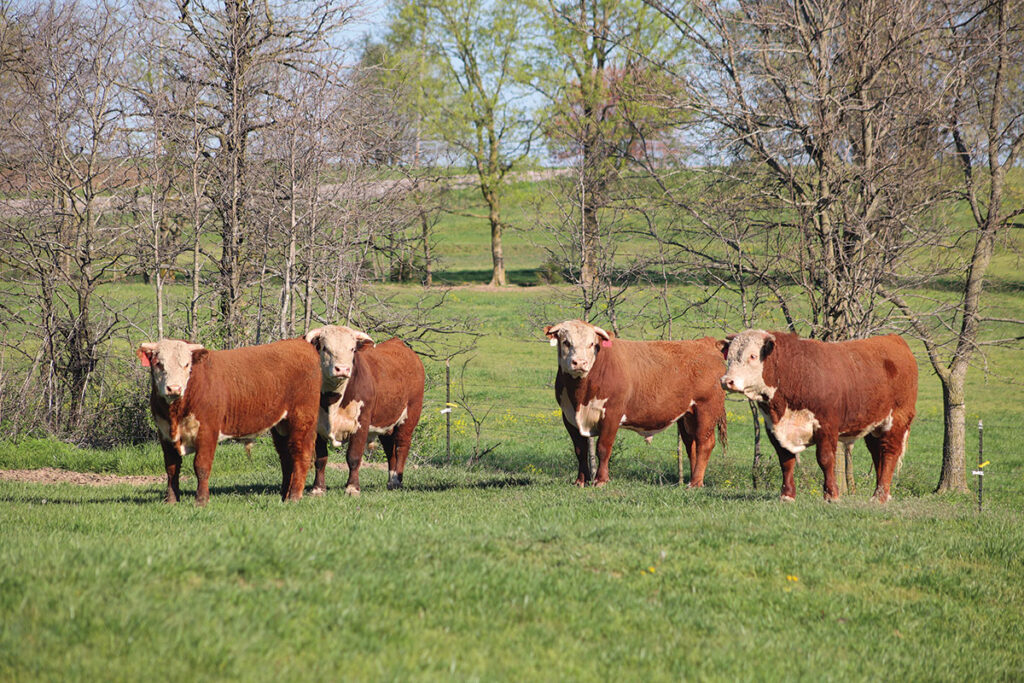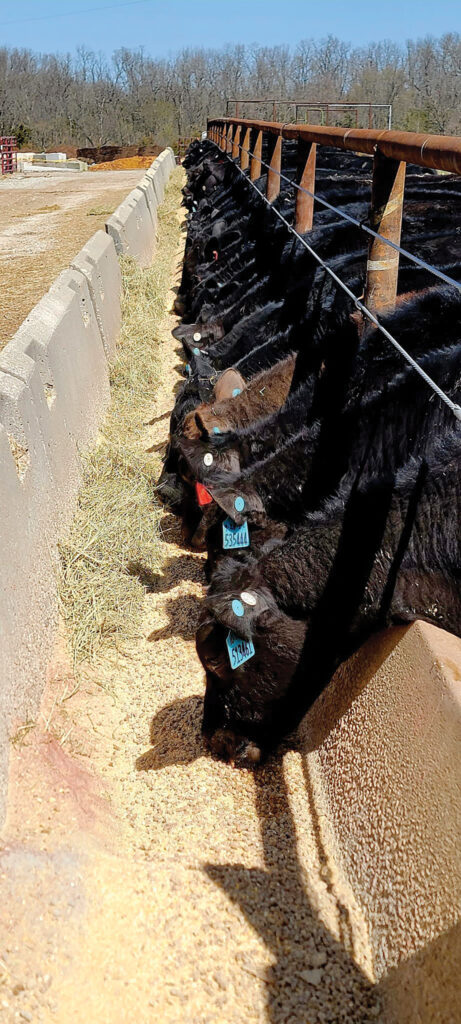
Josh Menzies and Menzies Cattle Company produce seedstock and backgrounds calves
ELKLAND, MO. – Menzies Cattle Company is a family business located near Elkland, Mo., in Webster County.
Owned and operated by Josh Menzies, it is a cattle operation serving a wide variety of livestock needs. His wife, Mindy, does a lot of the paperwork. Their daughter, Halle, (17) also helps with paperwork. Their son, Kyler (18), works every day on the farm.
“They each have their own cattle herd and want to be involved in this after school when they graduate,” Josh said.
They have a seedstock business and also sell bulls by private treaty.
Additionally, Menzies Cattle Company graze a number of stocker calves. Josh buys calves weighing 500 to 600 pounds.
“We’ll turn them out on grass and sell them at about 900 pounds,” he explained. “It is backgrounding, but they’re called stockers.”
Josh grew up on a small farm in Webster County.
“I went to work for Pete Luzaich when I was 15,” he said. That’s how he got started in the cattle business.
Aside from the stocker cattle, Josh raises cow/calf pairs.
“We have registered cattle that we’re deriving seedstock, using as a seedstock base to have bulls and females to sell,” he explained.
He is running around 200 cow/calf pairs of registered Angus and Herefords. On the seedstock side of his operation, they’re all registered.
His favorite breed is “whatever makes the most money,” Josh joked. “But probably the Herefords. They’re docile. They can go out and survive in any environment,” he said.
“The reason we started raising our own seedstock is because we were buying bulls from out of state; Montana and South Dakota,” Josh said. “While they had really good genetics, they had to come to Missouri and be introduced to fescue and they had to get those cows bred in the heat of the summertime. We ended up with a lot of bulls that had feet problems and wanted to stand in the pond and couldn’t handle the fescue and the humidity.”

Josh started raising his own seedstock to make Angus and Hereford bulls with the qualities he wants.
“Not put too much flesh on them,” he said. He feeds a high-roughage diet while getting them ready to sell. “We still get the advantage of having those genetics that they have in the north, but we sort through the cattle that can handle the fescue and handle the humidity and the rocks and the summers of the Ozarks. We take it upon ourselves to get that product ready for our customers, so they don’t have to deal with a bull standing in the pond from June to September.”
The bulls Josh is selling are typically 18 to 24 months old.
“We feel having a little age on the cattle makes for a better product. It makes for a tougher bull that can go out and work all summer for our customers,” he said.
Josh feeds his cattle predominately grass. “We call it the FFA diet; fescue and fresh air,” he said. “We don’t over graze, so we usually don’t have to feed hay until January.”
Josh has bought from North Dakota, South Dakota, Montana and Wyoming., but now has a predominately closed herd.
“We still buy a few select females or a few select bulls, but we AI everything,” he said. “We’ve got enough replacements now, so we don’t have to buy too many for the seedstock.”
For Josh, having Hereford and Angus is “a no-brainer.”
“If a person has a black Angus herd, they need to have a Hereford bull on it,” he said. “Most people don’t have just straight Herefords, but if they do, they need to have an Angus bull on it because you’re getting that heterosis. If you’re not taking advantage of heterosis, you’re missing a lot of free money.”
Utilizing that practice, Josh plans to have 150 black baldie and Hereford commercial females to sell this fall. They will be bred to a low-birthweight Angus bull.
For Josh, a good cow is one that will go out and raise a good calf on fescue.
“She has to have a good temperament and she has to breed back every year,” he explained. “Longevity is a big thing in profitability, because people really figure the depreciation value on a cow on a per year basis.”
Josh believes that is something the Hereford breed really brings to the table; whether it’s a black baldie or a straight Hereford.
“The longevity is there, because of the maternal qualities of a Hereford,” he said.







